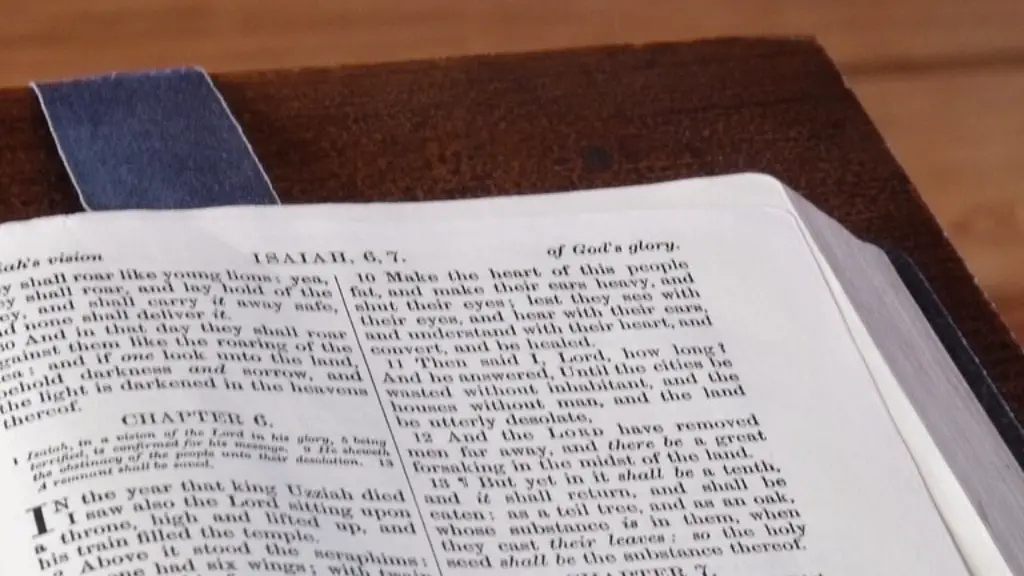What Is Chaff In The Bible? Chaff is a term used throughout the Bible to represent worthless and useless pieces of grain from the harvest. Traditionally, it would be winnowed away from the more valuable grains, such as barley, wheat, and rye. Chaff has continued to be used as a metaphor throughout Bible texts to refer to the fate of evildoers or the effects of sin on a person’s life.
Chaff is mentioned several times throughout the Bible, especially in the prophetic books, such as Isaiah and Jeremiah. Some of the most well-known references to chaff come from the Book of Psalms and the parable of Jesus in the Gospel of Matthew. In the Book of Psalms, chaff is used to symbolize how God will separate the righteous from the wicked. In Jesus’s parable of the weeds among the wheat, he compares the wheat to the people who believe and follow God and the weeds to the people who do not. In this parable, Jesus speaks of how the weeds, or chaff, will be cast out and burned.
Chaff is also often used to represent the temporary and fading nature of the world. Biblical writers emphasize the frailty and impermanence of the physical world by referring to chaff. They warn of the danger of becoming too attached to the material world and emphasize the importance of focusing on spiritual matters. For example, Job 24:24 says, “He stands alone and needy; He erects his drum against the chaff.” This verse explains how those who take refuge in God and cling to his justice will always be in a better position than those who try to attain justice in worldly terms.
In addition to the use of chaff as a metaphor, the Bible speaks specifically of the process of winnowing. In some books of the Bible, winnowing is used as a metaphor for judgement. In other books, it is described as a physical process, one that was used in the Old Testament to separate grain and chaff, as well as other agricultural processing. For example, Deuteronomy 25:4 details the rules for winnowing wheat: “You shall not muzzle the ox when it is treading out the grain,” which was a common practice during winnowing.
The use of chaff as a metaphor in the Bible has powerful implications. It reminds us that sin has consequences, and it should be avoided in order to have a productive and meaningful life. It also teaches us that God will judge wisely, so there is no need to worry about worldly justice. Finally, it warns us of the dangers of becoming too attached to the material world and encourages us to focus on the spiritual aspect of life.
History Of Chaff
For centuries, the process of winnowing was a tedious and labor-intensive practice. It involved the separation of grain and chaff, a process that was often a part of threshing. Threshing is the process of separating whole grains of wheat and other crops from the stems and husks. This process was mostly done by hand and could be quite time-consuming. Winnowing was often done after threshing and was critical to the separation of the grain.
Threshing was done by first striking the sheaves against the floor or walls of a threshing shed in order to help dislodge the grain from the husks. Once the grain had been separated from the husks, it was then time for winnowing. Traditionally, this process was done with a winnowing fan, which is a large basket made of wicker or rushes, with a handle on one side.
A winnowing fan was used by shaking it back and forth in the air. This created an air current that separated the chaff and other light material from the more substantial grain. The heavier grain would then fall to the floor, while the lighter chaff was blown away by the wind. In this way, the grain was separated from the more useless chaff.
Modern Uses
Today, winnowing is not a necessary process for the harvesting of grain. The advent of modern machinery has made the task much easier and has allowed for more efficient harvesting of grain. However, there are some cases where winnowing is still used. In countries where grain is harvested by hand, the winnowing process is still necessary to separate grain from chaff. It is also used by some farmers in order to produce grain with an even distribution of hull and grain.
In addition to its traditional uses, winnowing is also used in some baking processes. For example, some bakers may use the process to sift different types of flour, or they may use it to create a finer grind of grain, such as in the case of whole wheat flour. Additionally, winnowing can be used to separate larger pieces of grain and chaff from smaller, more delicate fragments.
Finally, winnowing is also used in some laboratory and scientific settings. For example, some laboratories may use it to separate out smaller particles from larger ones for more precise testing and analysis. In addition, some geologists may use winnowing as a way to extract different types of minerals from a sample of soil or rock.
Folklore Of Chaff
In addition to its religious and agricultural uses, chaff has had a place in folklore and superstitions throughout the ages. In some cultures, the presence of chaff has been thought to be a sign of good luck, while in other cultures it has been seen as a symbol of bad luck. In some folklore, chaff was believed to be the vehicle through which evil and misfortune entered the home.
In some parts of the world, chaff is still believed to carry magical powers. As such, it is often used in rituals and spells in these cultures. For example, some cultures believe that when certain rituals are performed with chaff, the people’s lives can be changed or transformed in some way. In addition, some people use chaff in divination and fortune-telling, believing that it can reveal things that are hidden from ordinary perception.
Other folklore surrounding chaff includes beliefs that it can encourage fertility and prosperity, as well as drive away pests and other unwanted guests. In some parts of the world, chaff is also used in wedding ceremonies and other celebrations. In these cases, it is believed to bring the couple good luck and ensure that the couple has a long and happy union.
The Significance Of Chaff
Today, chaff is still used in many parts of the world. It is still used as a metaphor in religious texts and literature, as well as in folklore and superstitions. Additionally, it is still used in some agricultural and scientific settings, as well as in some traditional rituals. In this way, chaff remains an important part of our lives and continues to be a symbol of both good and bad fortune.
For thousands of years, chaff has been a part of our lives and has served as a reminder of the transient nature of life. It is a symbol of how quickly the material world can be taken away and how fleeting our lives can be. In this way, it serves as a reminder to live life to the fullest, to appreciate what we have, and to focus our efforts on things that have a lasting and meaningful impact.
Chaff In The Bible Today
The references to chaff in the Bible remain as relevant today as they were in ancient times. The symbols used still serve to remind us of the importance of avoiding sin, focusing on spiritual matters, and appreciating the frailty and impermanence of the physical world. In this way, chaff remains a powerful and important symbol in the Bible and serves as a reminder of the importance of living life according to a higher purpose.
When read today, the references to chaff in the Bible are just as powerful as they were when first written. They serve to remind us of the consequences of our actions, the importance of following God’s will, and the need to focus on spiritual matters. In these respects, chaff remains an important and powerful symbol in the Bible and serves as a reminder of the importance of leading a life of righteousness and faith.
Conclusion
Chaff is a powerful symbol in the Bible, as well as in folklore and superstitions. It is a reminder of the impermanence of the physical world and how quickly it can be taken away. It is also a reminder of the dangers of following the material world and of the importance of focusing on spiritual matters. Finally, chaff serves as a reminder of the need to live life according to a higher purpose and to avoid sin in order to have a productive and meaningful life.




